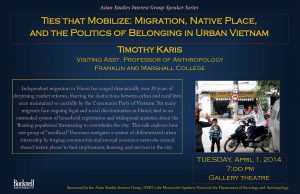Independent migration to Hanoi has surged dramatically over two decades of deepening market reforms, blurring the distinctions between urban and rural lives once maintained so carefully by the Communist Party of Vietnam. Yet many migrants face ongoing legal and social discrimination in Hanoi, tied to an outmoded system of household registration (ho khau), and widespread anxieties about the ‘floating population’ threatening to overwhelm the city. This talk explores how one group of “unofficial” Hanoians’—migrant motorbike taxi drivers from Nam Dinh Province—navigates a system of differentiated urban citizenship by forging communities and mutual assistance networks around shared ‘native places’ (que huong) to find employment, housing, and services in the city. It also reveals how Hanoi’s marginal urban spaces—home to entrenched migrant communities of ambiguous legality—emerge as key arenas in the negotiation of Vietnamese citizenship, forcing national leaders, city officials, landlords and residents to grapple with questions of free movement and the rights of rural citizens to transgress urban space. Finally, putting reform-era practices of urban migration in the context of other peasant-driven political “movements” across time and space, it speculates on the different channels available—and actors involved—in the exercise of citizen power and the expansion of rights in contemporary Vietnam.
